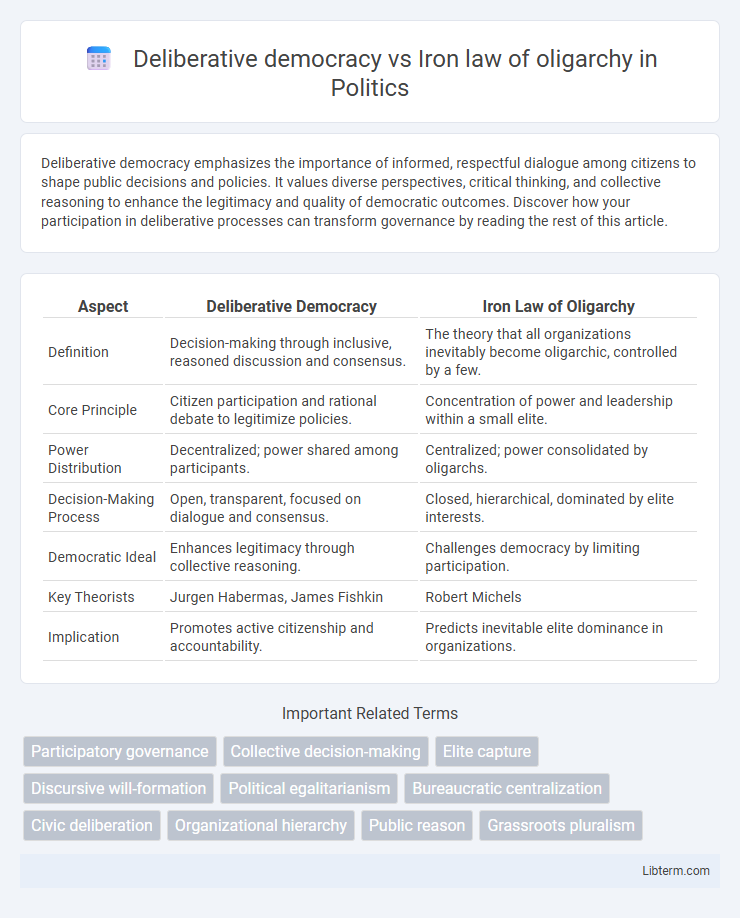Deliberative democracy emphasizes the importance of informed, respectful dialogue among citizens to shape public decisions and policies. It values diverse perspectives, critical thinking, and collective reasoning to enhance the legitimacy and quality of democratic outcomes. Discover how your participation in deliberative processes can transform governance by reading the rest of this article.
Table of Comparison
| Aspect | Deliberative Democracy | Iron Law of Oligarchy |
|---|---|---|
| Definition | Decision-making through inclusive, reasoned discussion and consensus. | The theory that all organizations inevitably become oligarchic, controlled by a few. |
| Core Principle | Citizen participation and rational debate to legitimize policies. | Concentration of power and leadership within a small elite. |
| Power Distribution | Decentralized; power shared among participants. | Centralized; power consolidated by oligarchs. |
| Decision-Making Process | Open, transparent, focused on dialogue and consensus. | Closed, hierarchical, dominated by elite interests. |
| Democratic Ideal | Enhances legitimacy through collective reasoning. | Challenges democracy by limiting participation. |
| Key Theorists | Jurgen Habermas, James Fishkin | Robert Michels |
| Implication | Promotes active citizenship and accountability. | Predicts inevitable elite dominance in organizations. |
Introduction to Deliberative Democracy
Deliberative democracy emphasizes inclusive, reasoned discussion among citizens to enhance decision-making legitimacy and promote transparency in governance. It contrasts with the Iron Law of Oligarchy, which asserts that all organizations inevitably concentrate power in a small elite, limiting true democratic participation. By fostering public deliberation, deliberative democracy aims to counteract oligarchic tendencies through widespread citizen engagement.
Understanding the Iron Law of Oligarchy
The Iron Law of Oligarchy, formulated by Robert Michels, asserts that all complex organizations inevitably develop oligarchic structures, concentrating power among a few leaders despite democratic intentions. This concept challenges the ideals of deliberative democracy, which emphasizes inclusive, reasoned discussion and equal participation in decision-making processes. Understanding the Iron Law reveals inherent tensions in sustaining true democratic governance within large institutions, highlighting the tendency for leadership to dominate and limit broader deliberative engagement.
Historical Origins and Key Theorists
Deliberative democracy evolved from the works of Jurgen Habermas, emphasizing rational discourse and public reasoning as foundations for legitimate decision-making in democratic systems. The Iron Law of Oligarchy, formulated by Robert Michels in the early 20th century, posits that all complex organizations inevitably develop oligarchic leadership structures, challenging the ideal of widespread democratic participation. Both theories originated in response to the tensions between democratic ideals and organizational realities, with Habermas focusing on communicative action and Michels highlighting structural power dynamics.
Core Principles of Deliberative Democracy
Deliberative democracy centers on inclusive, transparent dialogue where diverse participants engage in reasoned debate to reach consensus, emphasizing equality and collective decision-making. It upholds the core principle that legitimacy arises from public deliberation rather than mere voting, aiming to balance power by fostering informed citizen participation. This contrasts sharply with the Iron Law of Oligarchy, which posits that organizational power inevitably consolidates among elites, limiting broad democratic engagement.
Mechanisms of Power Concentration in Oligarchies
The iron law of oligarchy posits that all complex organizations inevitably develop a concentration of power within a small elite group, driven by structural necessities such as delegation, expertise, and hierarchical management. Mechanisms of power concentration in oligarchies include control over information, gatekeeping decision-making processes, and institutionalizing authority to limit broader participation. In contrast, deliberative democracy seeks to counteract these tendencies through inclusive dialogue, transparency, and institutional designs that promote equal participation and accountability.
Strengths and Weaknesses: A Comparative Analysis
Deliberative democracy emphasizes inclusive, reasoned dialogue that enhances legitimacy and accountability but may face challenges in scalability and decision-making speed. The iron law of oligarchy highlights the tendency of organizations to concentrate power among elites, ensuring efficiency but risking authoritarianism and reduced participation. Balancing these models requires addressing deliberative democracy's potential inefficiencies and the oligarchy's propensity for power consolidation to foster effective, representative governance.
Case Studies: Real-World Applications and Challenges
Deliberative democracy emphasizes inclusive, reasoned debate as seen in Iceland's Constitutional Council, where citizen assemblies drafted constitutional reforms through participatory dialogue. Conversely, the Iron Law of Oligarchy is evident in organizations like the U.S. labor unions, where leadership consolidation often limits grassroots influence despite democratic structures. These case studies reveal challenges in balancing authentic citizen participation with enduring tendencies of power centralization in democratic institutions.
The Role of Participation and Inclusivity
Deliberative democracy emphasizes broad citizen participation and inclusivity as essential for legitimizing decisions and fostering collective problem-solving, encouraging diverse voices to engage in reasoned debate. In contrast, the Iron Law of Oligarchy posits that organizational participation eventually diminishes as power consolidates within a small elite, limiting inclusivity and undermining democratic ideals. The tension between these concepts highlights the challenge of maintaining genuine, widespread participation to prevent oligarchic control in democratic institutions.
Safeguarding Democracy Against Oligarchic Tendencies
Deliberative democracy emphasizes inclusive, transparent, and rational public discourse to ensure broad citizen participation, which helps safeguard democracy against oligarchic tendencies by preventing concentration of power in a few elites. The iron law of oligarchy, formulated by Robert Michels, states that all organizational structures inevitably evolve into oligarchies, highlighting systemic risks to democratic governance through entrenched leadership. Implementing mechanisms such as participatory decision-making, accountability standards, and institutional checks counters oligarchic drift by distributing authority and fostering continuous civic engagement.
Future Prospects: Can Deliberative Democracy Overcome Oligarchy?
Deliberative democracy promotes inclusive, reasoned dialogue among citizens, enhancing transparency and collective decision-making, which challenges the concentration of power inherent in the iron law of oligarchy. Future prospects depend on institutional reforms that facilitate broad participation, institutional checks, and digital innovations enabling real-time citizen engagement. Successfully combining these elements could mitigate oligarchic tendencies by distributing power more equitably across diverse societal groups.
Deliberative democracy Infographic

 libterm.com
libterm.com